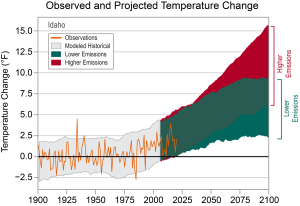Temperatures in Idaho have risen almost 2°F since the start of the 20th century. As periods of extreme heat in the summers continue to be exacerbated by climate change, watch for signs of heat-related illnesses and ways to respond. If you are sick and need medical attention, contact your healthcare provider for advice and shelter in place if you can. If you are experiencing a medical emergency call 9-1-1.
Preparing for Extreme Heat
- Learn to recognize the signs of heat illness.
- Do not rely on a fan as your primary cooling device. Fans create air flow and a false sense of comfort, but do not reduce body temperature or prevent heat-related illnesses. Install window air conditioners and insulate the area around them.
- Identify places in your community where you can go to get cool such as libraries, grocery stores, and shopping malls or contact your local health department to find a cooling center in your area. Call 2-1-1 to find a cooling center near you.
- Cover windows with drapes or shades. Weather-strip doors and windows. Use window reflectors specifically designed to reflect heat back outside. Add insulation to keep the heat out.
If you are unable to afford your cooling costs, weatherization or energy-related home repairs, contact the Low Income Home Energy Assistance Program (LIHEAP) for help.
During an Extreme Heat Event
- If air conditioning is not available in your home, go to a cooling center.
- Take cool showers or baths.
- Wear loose, lightweight, light-colored clothing.
- Use your oven less to help reduce the temperature in your home.
- If you’re outside, find shade. Wear a hat wide enough to protect your face.
- Drink plenty of fluids to stay hydrated.
- Avoid high-energy activities or work outdoors, during midday heat, if possible.
- Check on family members, friends, people with disabilities, seniors, and neighbors.
- Watch for heat cramps, heat exhaustion, and heat stroke.
- Never leave people or pets/service animals in a closed car on a warm day. If animals are outside, make sure they have plenty of cool water and access to comfortable shade. Asphalt and dark pavement can be very hot to your animals’ feet.